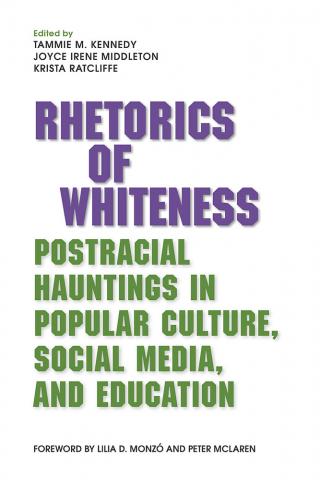By SIU Press
With the election of our first black president, many Americans began to argue that we had finally ended racism, claiming that we now live in a postracial era.
Yet near-daily news reports regularly invoke white as a demographic category and recount instances of racialized violence as well as an increased sensitivity to expressions of racial unrest.
Clearly, American society isn’t as color-blind as people would like to believe.
In Rhetorics of Whiteness: Postracial Hauntings in Popular Culture, Social Media, and Education, contributors reveal how identifications with racialized whiteness continue to manifest themselves in American culture.

The 16 essays that comprise this collection not only render visible how racialized whiteness infiltrates new 21st-century discourses and material spaces but also offer critical tactics for disrupting this normative whiteness.
Specifically, contributors examine popular culture (novels, films, TV), social media (YouTube, eHarmony, Facebook), education (state law, the textbook industry, dual credit programs), pedagogy (tactics for teaching via narratives, emotional literacy, and mindfulness) as well as cultural theories (concepts of racialized space, anti-dialogicism, and color blindness). Offering new approaches to understanding racialized whiteness, this volume emphasizes the importance of a rhetorical lens for employing whiteness studies’ theories and methods to identify, analyze, interpret, and interrupt representations of whiteness.
Although whiteness studies has been waning as an active research field for the past decade, the contributors to Rhetorics of Whiteness assert that it hasn’t lost its relevancy because racialized whiteness and issues of systemic racism persist in American society and culture today.
Few whiteness studies texts have been published in rhetoric and composition in the past decade, so this collection should quickly become mandatory reading.
By focusing on common, yet often overlooked, contemporary examples of how racialized whiteness haunts U.S. society, Rhetorics of Whiteness serves as a valuable text for scholars in the field as well as anyone else interested in the topic.
–
See also: Reading, Writing, and The Rhetorics of Whiteness.
“In this volume, Ryden and Marshall bring together the field of composition and rhetoric with critical whiteness studies to show that in our ‘post-race’ era whiteness and racism not only survive but actually thrive in higher education.
“As they examine the effects of racism on contemporary literacy practices and the rhetoric by which white privilege maintains and reproduces itself, Ryden and Marshall consider topics ranging from the emotional investment in whiteness to the role of personal narrative in reconstituting racist identities to critiques of the foundational premises of writing programs steeped in repudiation of despised discourses.
“Marshall and Ryden alternate chapters to sustain a multi-layered dialogue that traces the rhetorical complexities and contradictions of teaching English and writing in a university setting. Their lived experiences as faculty and administrators serve to underscore the complex code of whiteness even as they push to decode it and demonstrate how their own pedagogical practices are raced and racialized in multiple ways.
“Collectively, the essays ask instructors and administrators to consider more carefully the pernicious nature of whiteness in their professional activities and how it informs our practices.”
–
Comments welcome.
Posted on January 5, 2017


